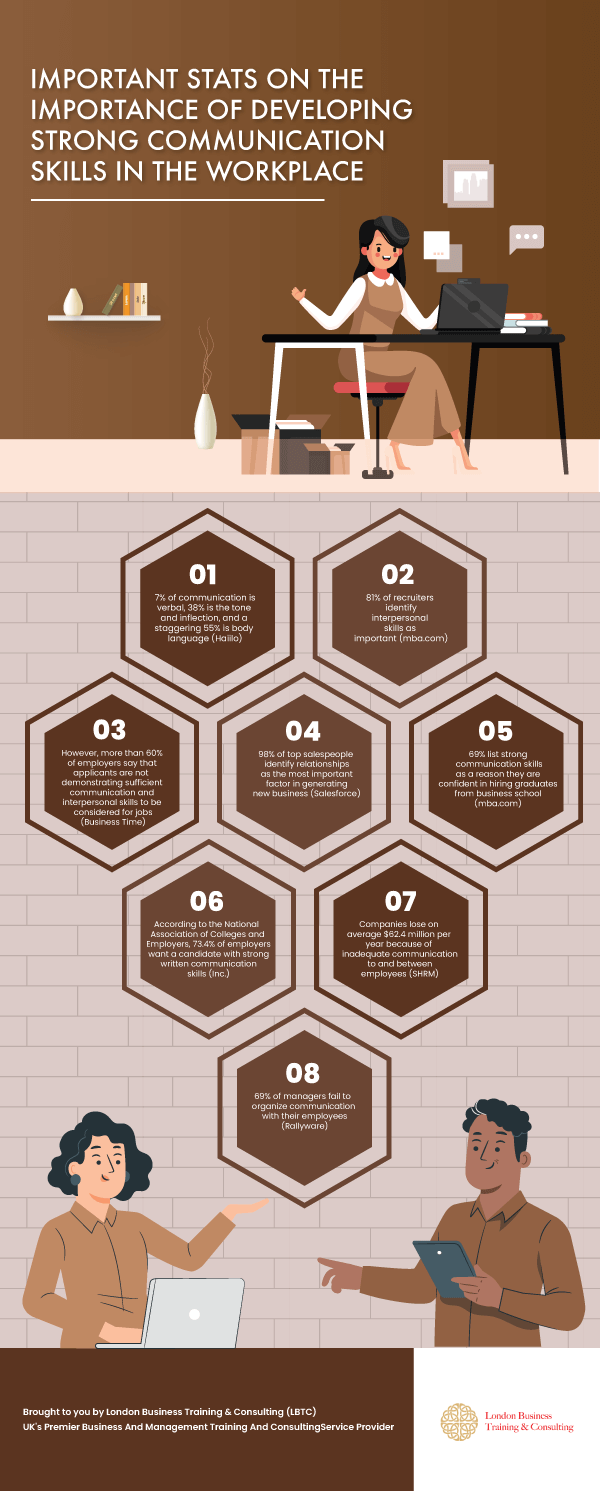
In order to build a successful profession, it is crucial to develop good communication skills. But your interpersonal abilities can have a big impact on your personal life. Discover the most in-demand communication abilities and how to enhance them.
Communication Skills: What They Are and How Important They Are in the Workplace
A strong public performance is ultimately made up of a variety of actions called communication skills.
Both in the business sector and daily life, communication is crucial nowadays.
Our capacity to understand others and our environment is aided by effective communication. It helps to get past disagreements, cultivate respect and trust amongst people, and create an atmosphere that fosters problem-solving and the sharing of innovative ideas.
One of the leaders’ primary priorities is improving communication.
Effective internal communications, according to many business owners, can significantly increase employees’ output.
Even if communication appears straightforward, there is frequently a potential for misunderstanding when we want to connect with others. This can lead to arguments and disappointments in both personal and professional relationships.
Gaining effective communication skills will help you connect with your friends, coworkers, and supervisor and improve workplace communication.
Why It’s Important to Work on Your Communication Skills
In this contemporary era, we receive, send, and process a significant quantity of communications each day.
However, conveying information alone is only one part of good communication; it also requires being conscious of the feelings that these facts are based on.
In both the personal and professional realms, good communication may improve relationships. In our daily lives, they can aid us in better understanding the people and events that surround us.
Developing strong communication skills may facilitate compromise, conflict resolution, and better decision-making.
The Influence of Effective Communication in the Workplace
You can influence your business if you have effective communication skills. Great communicators deliver solutions, promote change, and inspire and encourage their colleagues.
Employee engagement, teamwork, decision-making, and interdepartmental communication in the workplace can all be improved by strengthening communication skills.
This makes communication abilities the most sought-after soft skill among businesses when hiring new staff.
Good communication skills allow managers to accept and give harsh messages without causing annoyance or damaging trust. Maintaining staff engagement and motivation is crucial.
You cannot ignore these 5 communication skills
Many other communication skills are important to have; however, today we will only focus on the top 5.
For successful communication on the job or in personal relationships, these five abilities are a must.
1. Listening
One of the most crucial components of communication is listening. Effective listening involves more than just understanding what is being said or written; it also involves being aware of the speaker’s emotions as they are expressing themselves.
An interlocutor’s relationship with the speaker can be strengthened and deepened if the speaker can see and feel that the listener is paying attention and understanding.
Careful listening may also foster a climate where everyone feels comfortable expressing their thoughts, feelings, and opinions, as well as making plans and coming up with innovative solutions to challenges.
2. Speaking directly
The foundation of communication is conversation; hence, its significance cannot be understated. Even the most casual, friendly talks between employees may foster mutual trust and even help identify problems before they get worse.
A chance to transact business can arise from a healthy amount of small talk with an unfamiliar person. Being approachable and friendly will enable you to converse with virtually anyone.
3. Things beyond verbal communication
When we talk about issues that are important to us, we convey a lot of nonverbal information.
Non-verbal signals include non-verbal communication, body language, breathing patterns, eye contact, attitude, and voice tonality. They also include facial expressions, hand gestures, attitude, and voice tone.
More than any words could ever express, the way you look, listen, create, react, and gesture says much more about your sentiments.
Why is it vital to have nonverbal communication skills?
Since 93 percent of interpersonal communication takes place non-verbally, according to research from Salesforce, you will be able to connect with people, express yourself, deal with difficult situations, and create stronger relationships at home and at work if you learn to read and interpret nonverbal cues.
4. Stress management
Stress has its uses and benefits for workers, but only in moderation. The communication process, the ability to form clear opinions, and appropriate behaviour and action can all be hampered by chronic stress.
When you are under stress, you could misinterpret others, give off unclear nonverbal cues, or act in odd ways. How often have you been under pressure while conversing with friends or co-workers and regretted what you said or did later?
Enhancing your stress management abilities will help you prevent these regrets, in addition to giving you the power to persuade the other party with whom you are in dispute.
5. Managing emotions
Feelings are a significant factor in communication. Making decisions frequently has a greater emotional impact than a cognitive one.
Your nonverbal conduct is influenced by emotions, which have an impact on how others interpret you and how you are perceived by others.
You won’t be able to articulate your wants and experiences if you are not conscious of your feelings, which is how you are guided. This may cause annoyance, misunderstanding, and conflict.
You can use the tools you have to manage your emotions to better comprehend other people, yourself, and the signals you send.
Even if feeling emotions makes it easier, many people experience powerful emotions like anger, sadness, or the dread of having their feelings ignored.
Final thoughts
These were the five important communication skills one must focus on developing for soft skills in workplace. You can check LBTC’s communication skills course to improve in this area.
Discover more about the “Introduction on the Top 5 Communication Skills and How to Develop Them in the infographic below. This will assist you in comprehending the fundamental abilities required for personality development.


Leave a Reply